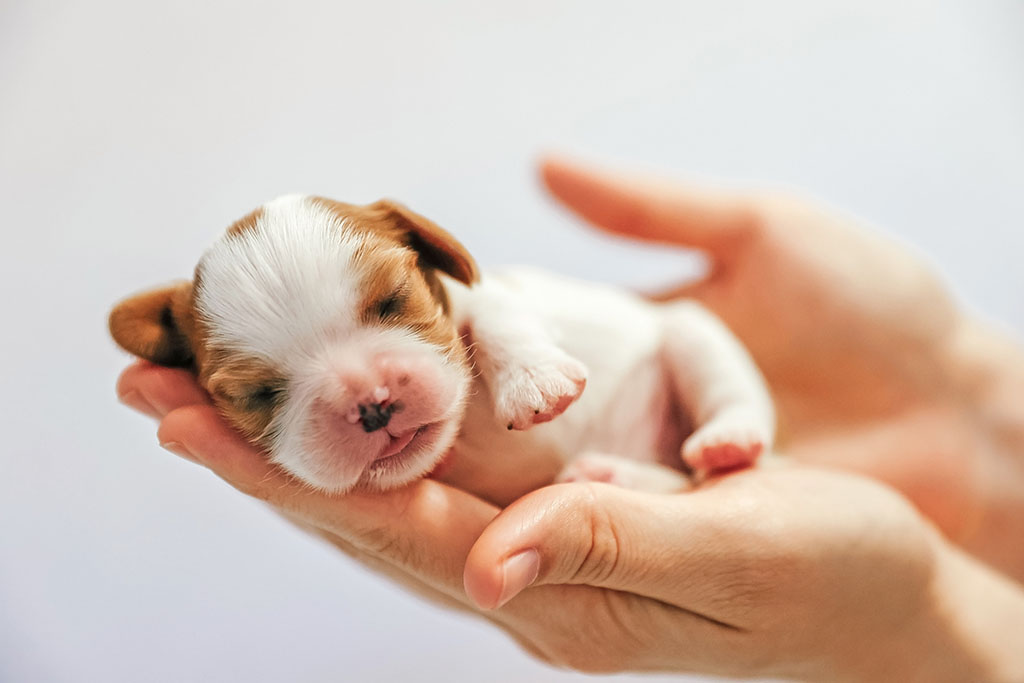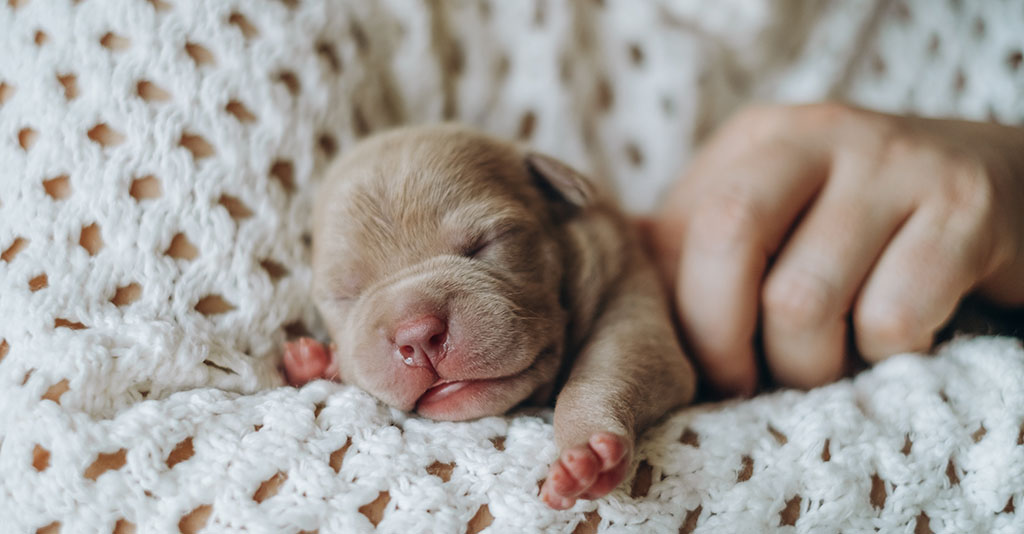
People and dogs have been living alongside each other for 15,000 years and the bond they have is very special, after all, we’ve all heard the saying that a dog is a man’s best friend! One way to build a strong relationship with your dog is to make eye contact, in a similar way to how mothers bond with their babies.
Studies have shown that when dogs and their owners spend time looking into each other’s eyes it can affect levels of oxytocin, the hormone associated with maternal bonding; dogs can have a 130% increase in oxytocin levels and humans a 300% increase!
But did you know that, unlike human babies, puppies don’t open their eyes for a couple of weeks after they’re born? They are completely oblivious to the world around them; their ears are sealed for the first 13 to 17 days, and they must rely on smell, touch and pheromones, which are chemicals released by the body that helps animals communicate with each other
.
These first few weeks of a puppy’s life are crucial in their development, and it’s important to be very patient. So, what do we need to know about when puppies open their eyes?

WHY ARE PUPPIES BORN WITH THEIR EYES CLOSED?
When puppies are first born their central nervous system isn’t fully developed. Their eyes and brain are still developing, and the optic nerve has yet to be formed. Some mammals give birth before their baby’s brain has fully matured because this enables them to leave their puppies in a safe place, safe in the knowledge that they can’t wander off, so that they can continue to hunt and provide for them.
Keeping the eyes shut helps stop infection and lets their eyes develop and grow safely, without the risk of being damaged by foreign objects; it also protects their delicate eyes from bright light.
WHEN DO THEY OPEN THEIR EYES?
In general, puppies open their eyes between 10 – 14 days, although this varies between individual dogs as well as between different breeds. For example, a Cocker Spaniel puppy will open its eyes before a Fox Terrier, and often bigger breeds, such as Great Danes and Mastiffs, open their eyes sooner.
Puppies don’t always open both of their eyes at the same time, often they’ll open one eye, then the other will open a couple of days later. It’s important to let it happen naturally, even if it takes longer than expected. You must never force a puppy’s eyes open.
WHAT CAN THEY SEE?
Once a puppy has opened its eyes it can still take 3 – 4 weeks for their vision to fully develop. Everything is still blurry for them, and they can’t see very far so they need to be kept away from bright lights and sunlight, preferably in a dimly lit room.
At first, they can only see blurred shapes and detect movement, but this improves fairly quickly over a matter of weeks, and by 8 weeks old a puppy should have the same level of vision as a fully grown adult dog.
WHEN SHOULD YOU BE WORRIED?
For most puppies, opening their eyes comes naturally, but it’s worth monitoring them carefully so that any issues can be dealt with before any problems develop. If your puppy has bulging, or swollen eyelids, or there is some pus or discharge, this could be a sign of infection and you should talk to a vet.
If your puppy hasn’t opened its eyes by three weeks old, it could be a sign that there are developmental issues, or an issue with their eyes, so it’s worth contacting a vet. It could just be the case that the room is too bright for them, but always get them checked over by a professional if you have any doubts.

FUN FACTS ABOUT DOGGY EYESIGHT
- Dogs aren’t colourblind – This is a myth. Dogs have different colour receptors to humans, so while they may not see colours the same way we do, they do still see them.
- Dogs are quite shortsighted – A 1995 study showed that dogs have 20/75 vision. This means that your dog can see things 20 feet away that a human with 20/20 vision can see from 75 feet. Don’t rush out to buy them a pair of specs just yet though; dogs have evolved to rely on their other senses, such as smell.
- Dogs have better night vision than we do – You might have noticed that your dog has really large pupils. As well as being super cute, these let in more light; dogs have more rods, or light receptors, than humans. They also have an extra layer of tissue at the back of their eyes that reflects light back through the retina.
- Dogs have better peripheral vision – The average human field of vision is 180 degrees, whereas a dog’s is around 250. Their eyes are also further apart, which makes them great hunters as they can see things without having to turn their heads. This can vary between breeds; sighthounds such as greyhounds, have even better peripheral vision.

Most pet parents won’t get to see when their puppy opens their eyes because it all happens when the puppy is still you too young to be taken away from the mother, but here at The Insurance Emporium we love a puppy fact, almost as much as we love puppies! If you want to learn more about puppies, take a look at our guide to socialising your puppy.
If reading this has inspired you to get your own little pooch, or if you already have one and are considering dog insurance, have a look at the different policy types we have to offer for puppies from 5 weeks old; remember, you can tweak some policies with a range of optional benefits so that it suits your needs, you might find it a real eye opener!
All content provided on this blog is for informational purposes only. We make no representations as to the accuracy or completeness of any information on this site or found by following any link on this site. We will not be liable for any errors or omissions in this information nor for the availability of this information. We will not be liable for any loss, injury, or damage arising from the display or use of this information. This policy is subject to change at any time.
We offer a variety of cover levels, so please check the policy cover suits your needs before purchasing. For your protection, please ensure you read the Insurance Product Information Document (IPID) and policy wording, for information on policy exclusions and limitations.


